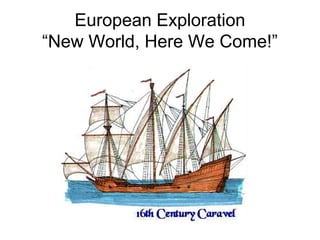
Explorer powerpoint
- 1. European Exploration “New World, Here We Come!”
- 2. Ferdinand Magellan Copy and paste the link into your browser for a great resource: http://library.thinkquest.org/J0026 78F/magellan.htm
- 3. Amerigo Vespucci Copy and paste the link into your browser for a great resource: http://library.thinkquest.org/J002678F /vespucci.htm
- 4. Juan Ponce de Leon Copy and paste the link into your browser for a great resource: http://library.thinkquest.org/J0026 78F/ponce_de_leon.htm
- 5. Henry Hudson Copy and paste the link into your browser for a great resource: http://library.thinkquest.org/403 4/hudson.html
- 6. Vasco Nunez de Balboa • Spanish Conquistador • First European to see the Eastern part of the Pacific Ocean in 1513. • He was searching for treasures (pearls and gold) • He traveled the ocean, with Francisco Pizarro, claiming all the land that touched it for Spain. • Balboa was charged with treason against Spain (although he was innocent and had been framed by a friend) • Franciso arrested Balboa. He was found guilty and publicly beheaded in January, 1519
- 7. John Cabot (about 1450-1499) • He was an Italian born English explorer and navigator. • Cabot sailed to Canada in 1497 commanding the small ship called “Matthew.” • He landed near Newfoundland on June 24, 1497, • Cabot claimed the land for England. • He explored the Canadian coastline and named many of its islands and capes. • The mission’s purpose was to search for a Northwest passage across North America to Asia (a seaway to Asia). • Cabot was unsuccessful, although he thought that he had reached northeastern Asia.
- 8. Sebastian Cabot (1474-1557?) • He was an explorer, mapmaker, and navigator. • He was employed by the English. • His father was John Cabot. • For Spain, he began a trip around the world (1526-1529) • Hostile natives and lack of food forced him to return to Spain. • His trip was deemed unsuccessful, and he was banished from Spain to Africa for two years (this punishment was later changed to one year) • He began to work for the English, searching for a water passage across the north of Asia. • On this voyage he sailed as far as northwestern Russia. • This expedition resulted in a successful trade agreement between England and Russia.
- 9. Jacques Cartier (1491-1557) • French explorer who led three expeditions to Canada in 1534, 1535, and 1541. • He was looking for a route to the Pacific through North America (a Northwest Passage) but did not find one. • Cartier paved the way for French exploration of North America • Cartier sailed along the St. Lawrence River. • He tried to start a settlement in Quebec (in 1541) but it was abandoned after a terribly cold winter. • He named the entire region Canada.
- 10. Samuel de Champlain (1567?-1635) • French explorer and navigator who mapped much of northeastern North America who started a settlement in Quebec. • Champlain also discovered the lake named for him (Lake Champlain) and was important in establishing and administering the French colonies in the New World. • He set up a fur trading center in Quebec. • Champlain befriended the Huron Indians and even helped them fight the Iroquois. • Champlain became governor of Quebec. • He died of a stroke on December 25, 1635. Champlain befriending the Huron Indians
- 11. Christopher Columbus (1451-1506) • Italian explorer who sailed across the Atlantic Ocean in 1492 hoping to find an all water route to India (in order to trade for spices). • He made a total of four trips to the Caribbean and South America during the years 1492- 1505. • Columbus sailed for the King and Queen of Spain. • On his first trip he landed on an island called Guanahani, but Columbus later renamed it San Salvador. He and his men were met by the local Taino Indians, many of whom were captured by Columbus’ men and later sold into slavery. Columbus meets the • Columbus thought he had made it to Asia, Taino Indians and called the area the Indies, and called its inhabitants Indians.
- 12. Christopher Columbus: second and third voyage • On a second, larger expedition (Sept. 25, 1493–June 11, 1496), sailed with 17 ships and 1,200 to 1,500 men to find gold and capture Indians as slaves in the Indies. Columbus sailed around Hispaniola and along the length of southern Cuba. He spotted and named the island Dominica on November 3, 1493. • On a third expedition (May 30, 1498-October 1500), Columbus sailed further south, to Trinidad and Venezula (including the mouth of the Orinoco River). Columbus was the first European since the Viking Leif Ericsson to set foot on the mainland of America.
- 13. The Nina, the Pinta, and the Santa Maria
- 14. Christopher Columbus: 4th voyage • On his fourth and last expedition (May 9, 1502- Nov.7, 1504), Columbus sailed to Mexico, Honduras and Panama (in Central America) and Santiago (Jamaica). • Columbus is buried in eastern Hispaniola (now called the Dominican Republic).
